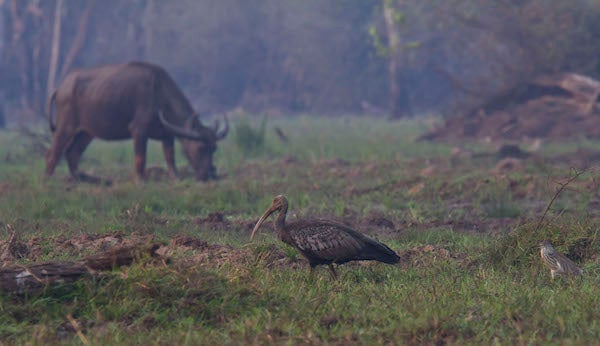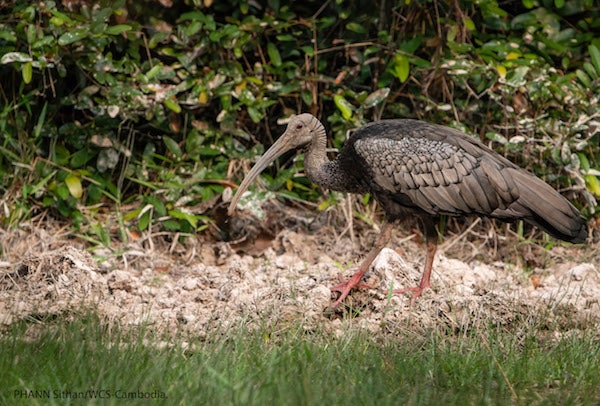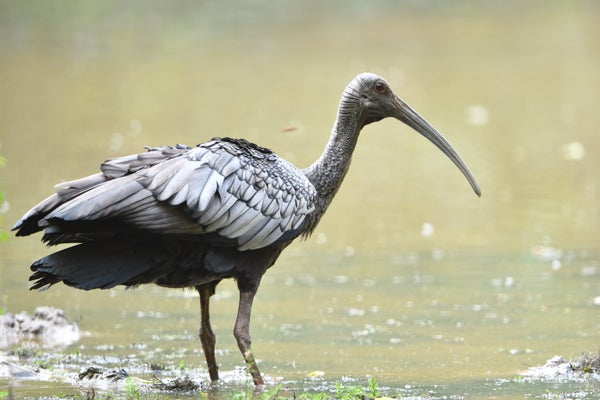This article was published in Scientific American’s former blog network and reflects the views of the author, not necessarily those of Scientific American
In a rare piece of COVID-19 good news, the Thai government recently announced that endangered leatherback turtles are returning to nesting beaches now devoid of tourists. However, at the same time, I was being interviewed by the BBC concerning the loss of three of one of Cambodia’s rarest birds, the giant ibis—acts we believe to be linked to the economic hardships of rural families brought about by the same crisis.
The protected areas of remote northern Cambodia where the giant ibis were killed are home to some of the most unique assemblages of endangered birds anywhere in the region. Over the last decade, they have given rise to an innovative ecotourism program.
Our partners at the local conservation enterprise Sam Veasna Conservation Tours bring birdwatchers from around the world to see these rare birds. Visitors, who stay in village eco-lodges, are shown birds by local guides. Over the last decade they have paid more than $100,000 into a community conservation fund. However, as in Thailand, the tourists are now gone, and it is not clear when they will be coming back.
On supporting science journalism
If you're enjoying this article, consider supporting our award-winning journalism by subscribing. By purchasing a subscription you are helping to ensure the future of impactful stories about the discoveries and ideas shaping our world today.

Giant ibis and water buffalo. Credit: Eleanor Briggs WCS
Today, for many rural people across far-flung parts of Cambodia, Laos, Myanmar and Thailand, COVID-19 is less a crisis of public health than economic survival. The financial impacts of the pandemic have been tsunami-like, rapidly reaching even the remotest parts of the interlinked markets of these lower Mekong countries.
Many of the worst hit are those living in and around protected areas and the forests and wetlands of highest biodiversity value. These local people have been largely reliant for cash income on small-scale agriculture and fisheries and, increasingly in areas like the one mentioned above, tourism. Others depend primarily upon remittances sent from family members working in the major urban centers of Bangkok, Yangon, Phnom Penh and beyond.
Suddenly, almost overnight, supply chains have broken down, tourists have disappeared and—most importantly—city employment has collapsed. Hundreds of thousands of migrant laborers in factories and service industries now find themselves out of work. The last few weeks have seen thousands of people return, often across borders, to their home villages in a massive migration from urban employment to rural unemployment.
While concern has been voiced as to the potential risk of increasing viral transmission vectors, little attention has been given thus far to the economic situation of rural people living often farthest from the centers of government.
Faced with a lack of income and no safety net, people in these situations have little to turn to but poaching, illegal fishing, logging and clearing forest. Unless these most vulnerable people receive immediate financial support, much of the region’s rich biodiversity and many of the conservation successes of the last two decades risk being lost in just a few months.
Now more than ever is the time to support the needs of communities in areas of high biodiversity value, to provide direct financial support that empowers local people to continue safeguarding their own environment.
In northern Cambodia, local community rangers and nest guardians are paid to patrol their own forests or waterways and protect the nests of endangered species, such as birds or turtles, until they hatch successfully. Through this program, in the landscape where the giant ibis lives, the Wildlife Conservation Society (WCS) now employs over 250 villagers annually, and we have witnessed the successful fledging of more than 6,000 endangered birds during the last 12 years.
It is essential to rapidly scale up those efforts and also ensure that guides previously employed in tourism have other employment options.

Credit: Phann Sithan WCS
Another successful local approach has been to integrate conservation objectives with local agricultural practices. The Ibis Rice program, created by the Wildlife Conservation Society, supports village farmers by purchasing organic jasmine rice from them at a 40 percent premium above the market rate. In return, the farmers agree not to clear forest or hunt birds. Today 1,400 families are benefiting from this model across the range of the giant ibis.
Their high-quality rice is sold across Cambodia and is now being exported to Europe, North America, Hong Kong and Singapore. By continuing to invest in key initiatives like this, we can ensure that local communities and biodiversity remain intact through the COVID-19 crisis.
While some animals, such as Thailand’s sea turtles, benefit from the absence of tourists crowding their nesting beaches, sadly most do not. The knock-on economic impacts of the COVID-19 crisis threatens the very survival of unique wildlife even in the remote protected areas of this region.
During the long wait for economies to reboot, factories to reopen, tourists to return and rural villages to recover, governments, donors, and conservation organizations such as ours, need to make sure the remotest communities are nor forgotten. Both the people and the wildlife in these places need the support more than ever.
Sam Veasna Conservation Tours and Ibis Rice are registered as Cambodia companies wholly owned by WCS. As a member of WCS senior management, the author sits on the boards of both.
Read more about the coronavirus outbreak from Scientific American here, and read coverage from our international network of magazines here.
